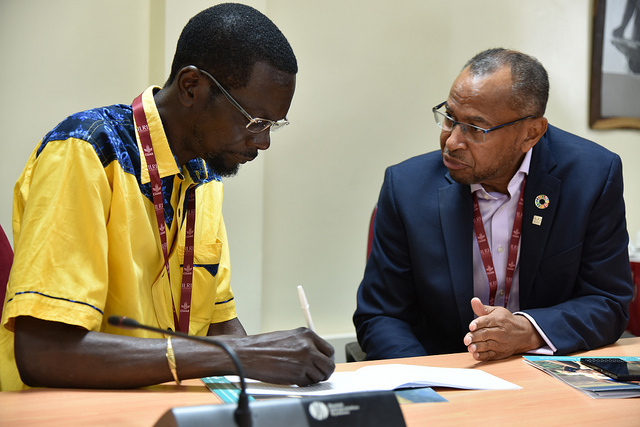Written by Ekta Patel

integrate and channel research and development efforts in tackling AMR. (photo credit: ILRI/Paul Karaimu)
As reported this week by Jacqueline Ogada, a journalist at SciDevNet, the director general of the International Livestock Research Institute (ILRI) said recently that ‘reducing the use of antimicrobials in agriculture as well as medicine . . . can make a huge difference’ in protecting public health.
ILRI Director General Jimmy Smith said this at a recent launch of a CGIAR Antimicrobial Resistance (AMR) Hub, which is based in ILRI’s Nairobi advanced biosciences laboratories. The new CGIAR AMR Hub, Smith said, will help accelerate the changes required to reduce antimicrobial use in the agriculture sectors of developing countries. The new Hub will do this, he said, by creating productive stakeholder partnerships and by placing research evidence at the very centre of policymaking in these countries.
To meet the rising global challenges AMR presents, Smith argued that developing countries need to have in place appropriate and practical research solutions as well as effective partnerships across disciplines. Both he reported, are at the heart of the CGIAR AMR Hub.
Journalist Ogada goes on to report the following.
‘About 28 million people could fall into extreme poverty by 2050 if high antimicrobial resistance is not addressed.
‘Antimicrobial resistance occurs when medicines for controlling infections caused by germs such as bacteria, fungi, viruses and parasites are no longer effective. According to the World Bank, antimicrobial resistance could cut annual global gross domestic product by about USD1 trillion by 2030 and reduce global livestock production by almost eight per cent.
‘According to Jonathan Wadsworth, lead agriculture specialist at the World Bank Group, antimicrobial resistance will negatively affect Sustainable Development Goals such as those that focus on poverty, good health and well-being.’
The CGIAR AMR Hub was launched 21–22 Feb 2019 in Nairobi, Kenya. It is hosted by ILRI and its Biosciences eastern and Central Africa-ILRI Hub and is supported by the CGIAR Research Program on Agriculture for Nutrition and Health, which is led by the International Food Policy Research Institute (IFPRI), and its donor and partner organizations.
Read the whole article by Jacqueline Ogada, Drug resistance could make 28 million people poor, at SciDev.net, 7 Mar 2019.